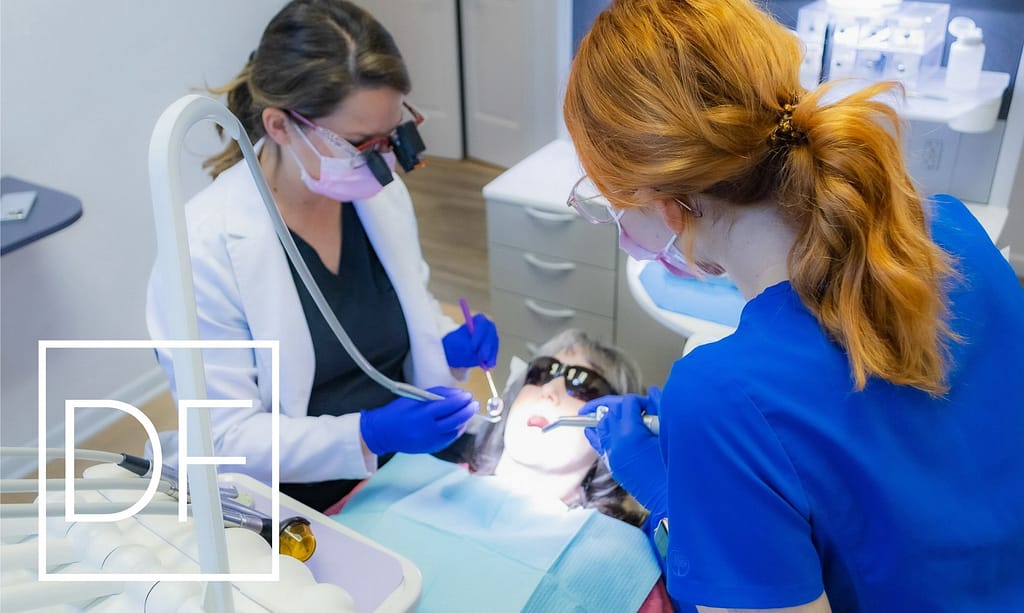6 Tips for Maintaining a Healthy Smile by Preventing Cavities

Practical Ways To Protect Your Smile
A vibrant, cavity-free smile is more than just aesthetically pleasing—it’s crucial for your overall oral health.
Cavities, the unfortunate result of tooth decay, are among the most common health problems in the world, yet they are also one of the most preventable. Beyond causing discomfort and pain, untreated cavities can lead to serious dental issues, including infections and tooth loss. That’s why keeping cavities at bay should be a focus of your oral hygiene routine.
Our Bedford dental team believes in empowering patients with knowledge and practical tips to prevent dental woes before they arise. So, let’s dive into the daily practices that will fortify your smile and ensure your teeth remain healthy, strong, and radiant.
How Cavities Are Formed
Cavities result from a process that begins with the interaction between sugar and the bacteria in your mouth. Many assume that it’s the sugar itself that directly causes tooth decay, but in fact, sugar just acts as a catalyst for bacteria.
When you consume sugary foods and beverages, the bacteria that naturally reside in your mouth feast on the sugar and produce acid. This acid is the true culprit behind cavity formation. Over time, its attacks weaken the enamel, eventually creating a small hole, or cavity.
If left untreated, a cavity will penetrate deeper into the tooth, affecting the soft dentin and potentially harming the tooth’s nerve, causing pain and risking tooth loss.
6 Tips for Keeping Your Smile Healthy
Maintaining a cavity-free smile isn’t difficult. Adopt these 6 simple steps into your routine, and you’ll be well on your way to achieving and supporting lifelong optimal oral health.
1. Brush your teeth twice a day with fluoride toothpaste.
Fluoride toothpaste is an essential component of dental care because it fights cavities and reverses the early stages of tooth decay. Fluoride, a naturally occurring mineral, helps rebuild and strengthen tooth enamel, making it more resistant to acid attacks from bacteria and sugars in the mouth. This remineralization process hinders cavity formation but can also help repair the very early stages of tooth decay before the damage becomes permanent.
2. Floss daily to remove plaque between teeth.
Flossing is vital for removing plaque from between teeth where a toothbrush cannot reach. It prevents plaque buildup and minimizes the risk of gum inflammation (gingivitis) and cavities. Additionally, flossing helps maintain healthy gums, which are fundamental to supporting strong, cavity-free teeth.
3. Limit sugary and acidic foods and drinks.
You know now that when sugar comes into contact with bacteria, it produces acid that can erode tooth enamel. So to protect your teeth, avoiding or limiting items such as candies, desserts, and sodas is advisable, as they contribute to tooth decay and enamel erosion. Surprisingly, some seemingly healthy beverages, like 100% fruit juice, can be just as damaging as a soda, particularly acidic citrus varieties. Although these juices may be rich in vitamins, their high sugar content and acid levels, like those of carbonated soft drinks, can attack the tooth enamel.
4. Rinse your mouth with water after consuming sugary or acidic items.
Rinsing with water immediately after consuming sugary or acidic foods and drinks can help wash away leftover particles and neutralize acids. This practice helps to minimize the contact time these substances have with tooth enamel, thus reducing the potential for decay and enamel erosion. Because of the dip in oral pH, wait 30 to 45 minutes after eating or drinking these items to brush your teeth.
5. Visit your dentist regularly for check-ups and cleanings.
Regular dental checkups and dental cleanings are crucial for maintaining optimal oral health. Dentists can detect and address issues early during these visits before they evolve into more significant problems. Professional dental cleanings are also essential to remove plaque and tartar buildup that daily brushing and flossing might miss. These appointments also provide an opportunity for expert advice on personal dental care routines and preventive measures for oral health preservation.
6. Consider dental sealants or fluoride treatments for added protection.
Dental sealants and fluoride treatments are preventive measures that offer extra layers of protection against tooth decay. Sealants are thin coatings applied to the chewing surfaces of the back teeth to keep food and bacteria from getting stuck in the grooves and causing cavities. Topical fluoride applications strengthen tooth enamel and can reverse early signs of tooth decay. Both treatments are quick and painless, and your dentist or hygienist can perform these during a routine visit.
What To Do If You Think You Have a Cavity
If you suspect that you might have a cavity due to tooth pain or sensitivity to hot or cold temperatures, it’s best to take action immediately.
Don’t adopt a wait-and-see approach hoping the discomfort will disappear. Instead, schedule an appointment with your dentist as soon as possible. Early detection and treatment are key to preventing further decay and minimizing the complexity of any necessary treatment.
Book a checkup and cleaning at Davis Family Dental Care.
Safeguarding your teeth from cavities preserves a healthy smile and supports your overall well-being. Remember: Prevention is always better than cure. By incorporating the 6 tips outlined in this blog post, you’re investing in the long-term health of your teeth and gums.
Don’t let tooth decay disrupt your life. Take the necessary steps today to ensure your oral health is in top condition. If you’re looking for experienced dentists in Bedford, Texas, to help you stay on top of your dental care, Davis Family Dental Care is here to support you. Contact us to schedule a checkup and cleaning and take a positive stride toward a healthy, radiant smile.
